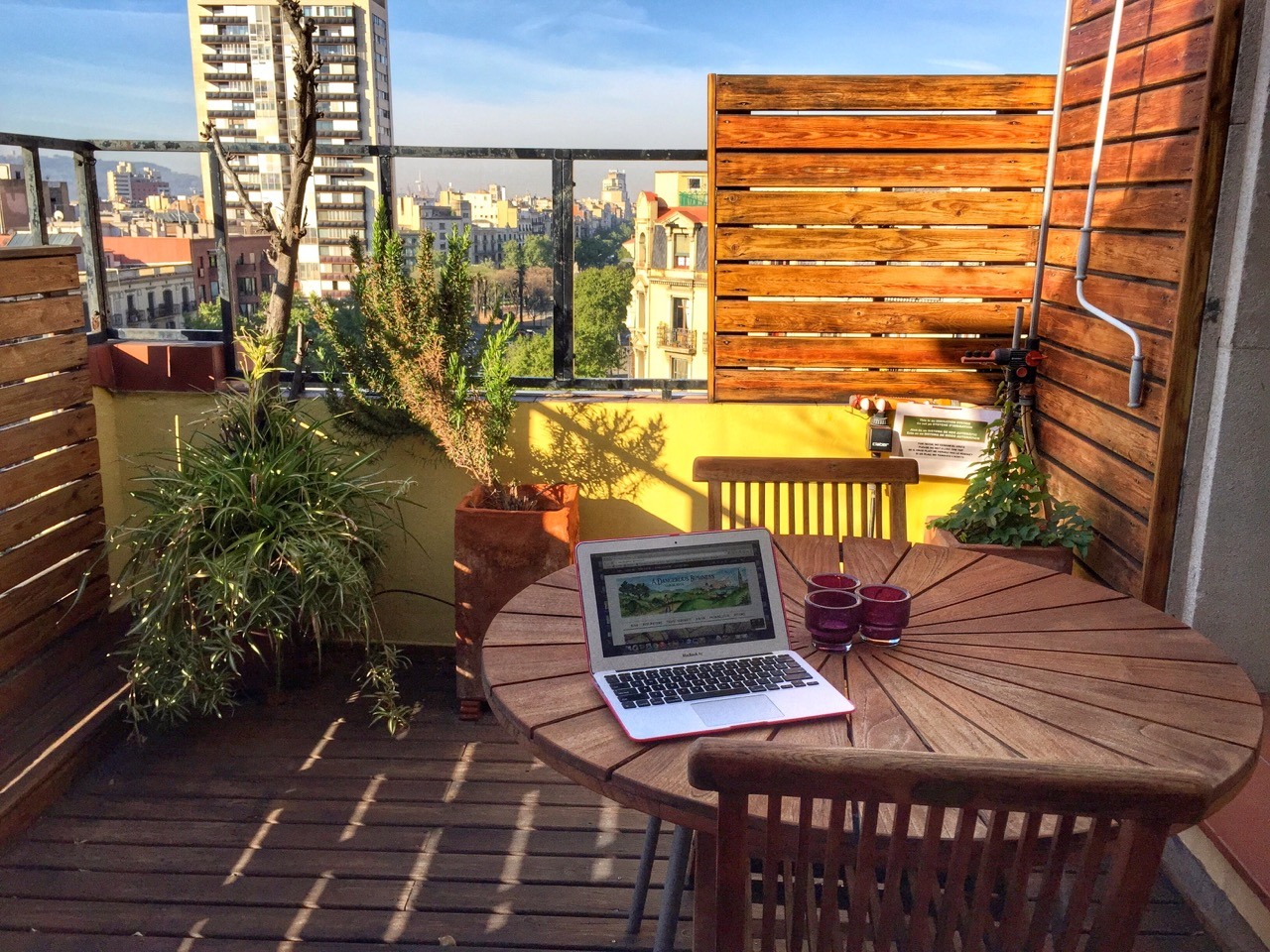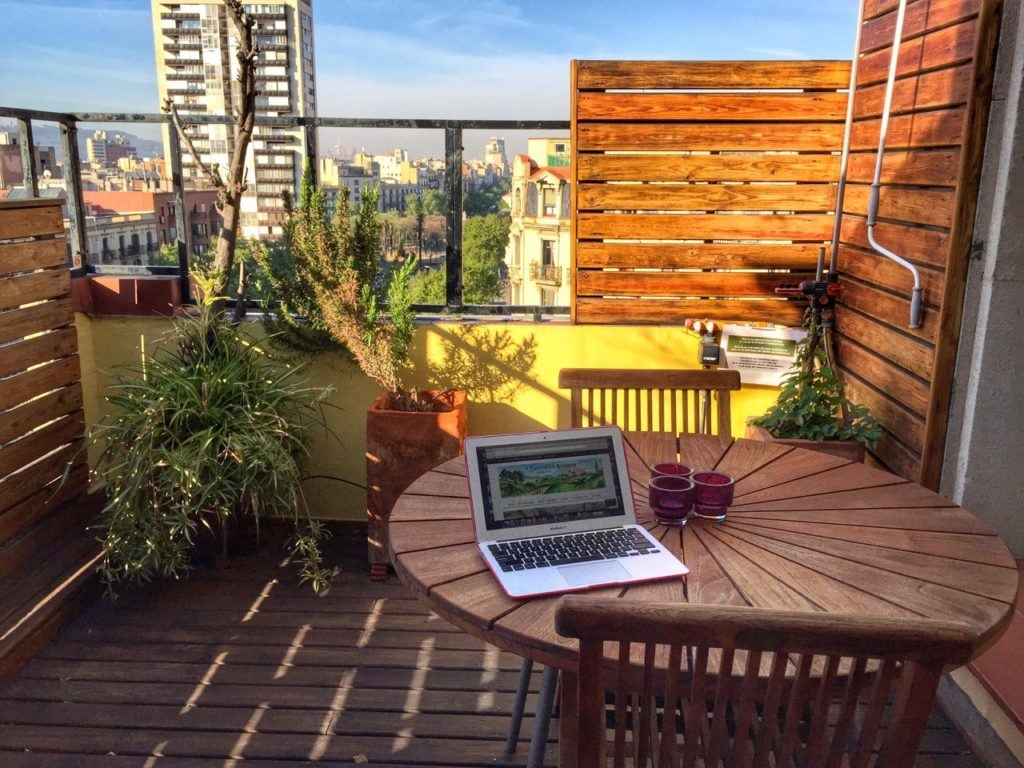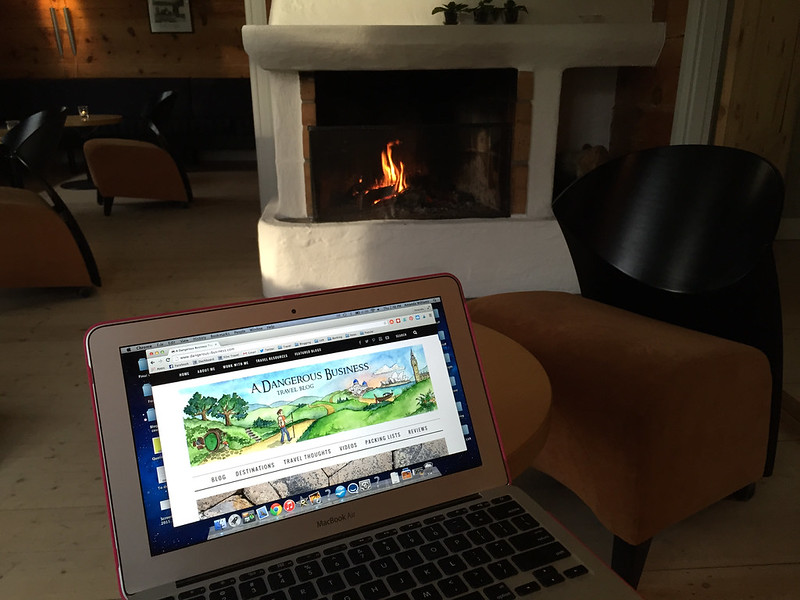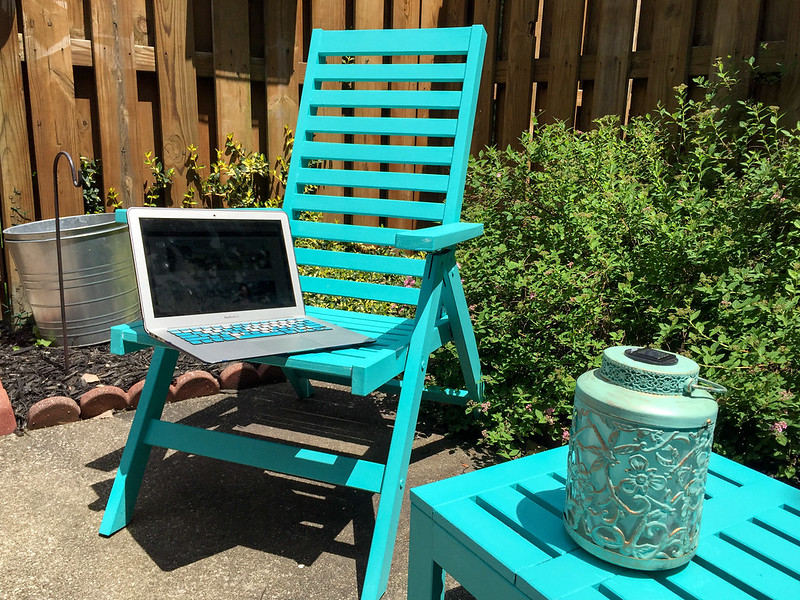What Working Remotely is Really Like + 7 Tips for Working From Home

Stopping by because you're now working from home for the first time thanks to the COVID-19 coronavirus? Check out the realities of working remotely, and scroll further down for my top tips for staying productive when you're working from home!
You've seen the photos – someone working on a laptop in a hammock, or on a beach, or on a hotel balcony with a killer view (yup, I'm guilty of this last one!).
You see these photos and assume that it's not a lifestyle that you could have for yourself; this is surely the lifestyle of someone with more freedom and less responsibility than you.
But what if I told you that wasn't necessarily true?
Twenty years ago, the concept of “remote work” wasn't even really a thing. People went to an office or out into the field to do their jobs. Hardly anyone worked from home. And, checking in for daily meetings from some remote corner of the world? Unheard of.

But, now, with the proliferation of the internet, many more jobs can be done outside the typical office environment than ever before. Telecommuting has been called “the future of work,” and the growth in remote work has been almost exponential (it's increased by 44% in the last 5 years alone).
So some curiosity about what “working remotely” really means is natural.
The Realities of Working Remotely
In some cases, a person might be able to work remotely (or from home) a couple times per month, or maybe even one or two days per week. That IS remote work – but not necessarily the type of telecommuting I want to talk about here. I want to tell you what working 100% remote is really like. What it's like to be “location independent” and make a living from wherever you happen to be in the world.
First of all, there are a couple different kinds of “remote work.”
- Freelancing – When you're a freelancer, it usually means that you're hired for projects – sometimes one-off, sometimes on an ongoing basis – and your workload and salary can vary greatly month to month. For example, I used to freelance frequently as a writer for a few different travel websites, but would also pick up one-off writing or social media gigs when I could get them.
- Contract work – When you're working on a contract, it means you can count on a certain amount of work for a set period of time. For example, when I was working for a software startup back in 2014/15, I was on a contract to work at least 20 hours per week. There's still usually some freedom with contract work when it comes to how/when you put in your hours, but it's generally steadier than straight-up freelance work.
- Full-time work-from-home – This type of remote work is more regimented; more like a full-time job. You have set work hours every day – you're just doing that work from your home rather than a traditional office.
These days, I'm a full-time blogger. While I used to focus on freelance and contract work, I have even more freedom now because my blog itself makes me a full-time income. This means I can take on as much (or as little) work as I want, based on what my travel plans look like.
And while I do have a home base in Ohio, I could conceivably be traveling full-time or living abroad and still be able to do what I do.

What kind of things can you do remotely, you ask? Well, things like:
- Writing
- Editing
- Transcribing
- Social media management
- Customer service
- Web/graphic design
- Content/email marketing
- Coaching/consulting
- Project management
Basically any job that you can do 100% from a laptop is something that can be done remotely.
Why working remotely is awesome
If working remotely sounds pretty great so far, that's probably because it is! Or, at least it can be. Having a location-independent lifestyle is great for many reasons.

For example:
1. You can make your own hours
Especially when you're a freelancer working remotely, you often have the freedom to set your own working hours. Not a morning person? No problem – start your work day at noon and work into the evening. Want to take the afternoon off to go to the beach or to a museum? You can do that, too.
As a blogger, my work load varies from week to week (and sometimes from day to day!). By planning ahead, I can often fit the bulk of my work into a few days if I know I want to dedicate some time to something else at some point during the week.
Even when I was working on a contract, I could usually plan my work around my schedule – even when I was traveling.
2. You can work from anywhere
The biggest upside to location independence and working remotely is, of course, the freedom to work from anywhere you want. All you really need is a laptop and a decent wifi connection.
I base myself out of Ohio, and therefore spend a lot of time working from my home (I like to joke about my daily “commute” from the bedroom to the living room or office). But when I travel, I usually take my work with me.
I've worked from balconies in Spain, terraces in the Greek Islands, cafes in New Zealand, the beach in Thailand, and while nestled up by the fire in Norway. The freedom to work AND travel is paramount to a travel blogger like me, but is a bonus to other types of remote workers, too.

Why remote work is challenging
Even though the freedom to work from anywhere and set your own hours is appealing, working remotely (especially as a freelancer) doesn't come without its challenges.
1. Self-accountability
When you're a freelancer or a contractor, it often means that you are your own boss. Sure, you might be hired to do specific work for a specific client and given a deadline, but it's ultimately up to YOU (and no one else) to make sure the work gets done on time.
There's a lot of self-accountability involved with working remotely, since you don't have a boss or coworkers around to keep tabs on you.
2. More distractions
Working from a co-working space is probably the best idea for most remote workers since it acts like your “office” – however it's not always feasible to pay for a desk somewhere. If you travel a lot like me, it's easier to work from home or from wherever you are on the road.
But the freedom to work from anywhere also comes with distractions. At home, there's always the TV, my cat, and every social media site out there tempting me into distraction. When I'm traveling, there's of course always the pull to be out exploring instead of working. If you're working remotely, you'll have to learn how to deal with the distractions in a way that still allows you to be productive.

3. You may not always have a steady paycheck
One of the biggest challenges for me as a blogger/freelancer is never knowing exactly how much money I'll be making each month. I often have to hustle for work, and the uncertainty of it all has seriously stressed me out in the past. This is minimized if you take on more contract work, or if you do your “normal” job from home, of course. But it's still something to think about.
I've worked hard in the past few years, though, to diversify my income streams so that I'm not relying on one job for all of my income. But diversifying takes time, and until you hit the perfect balance you may not have a steady paycheck to rely on each month.
RELATED: How I Make Money as a Blogger
4. It can be hard to stop working
Lastly, another huge challenge that I face while working remotely is striking a balance between work and play. It's easier when I'm traveling, since exploring a new destination trumps sitting in front of a laptop just about any day. But when I'm at home, I struggle. I tend to work better in the afternoons/evenings, but this means that I'm often opening up my laptop when a new work idea strikes me well into the night.
It's something I don't usually think twice about since I LOVE what I do, but I do realize that I don't have the healthiest work/life balance. Some days I literally have to force myself to close my laptop and put away my phone and do something that doesn't have anything to do with work. This is something I'm constantly working on!
Is remote work worth it?
I've talked to plenty of people who don't think working remotely or being a freelancer would be a good fit for them. And that's totally fair – being your own boss, setting your own hours, and dealing with salary uncertainty isn't for everyone. There are also some days where I definitely do miss having coworkers and friends in an office, too.
But, at the end of the day, this type of lifestyle IS for me. I love being able to plan a trip whenever I want, and I love that I can write a blog post or manage a social media account from the other side of the globe.
Even though the challenges seem… well, challenging, the pros of working remotely far outweigh the cons in my eyes.
7 tips for working from home
Whether you're new to remote work or an old hand at it, you still need to treat it like work – meaning you need to know what you need to do in order to stay as productive as possible.
Here are my top tips for working from home that will help you be both comfortable and productive!
1. Know your work style
If you know you work best in the afternoons instead of the mornings, don't fight it. This is the case for me, so I usually spend my mornings doing things like handling my email inbox and checking on social media. I save the real “work” (in my case, writing and editing) for the afternoon.
If you know you need a standardized routine in order to get things done, work on establishing one that can be adapted no matter where you'll be working from. (And if you're switching from working in a regular office setting to working at home, try to replicate your usual office routine as you ease into remote work.)
2. Stay organized
Whether you have a boss to answer to or run a one-person show like I do, staying organized and on top of your to-do list is so incredibly important. I stay best organized when I can make lists and set deadlines, and then hold myself accountable to them.
My favorite apps for keeping track of tasks include CoSchedule (for my editorial calendar), Trello, and my Google Calendar. Other good organizational tools to check out include Todoist and Notion.
3. Create an ideal work environment
Because I've been doing this for a while, I can essentially work anywhere that has good wifi. But obviously things like a comfortable place to sit and some natural light help, too. Make sure your work environment works for you, whether your necessities are as simple as a couch and a laptop, or as complex as multiple monitors and ergonomic gadgets.

4. Know how to handle distractions
There are plenty of handy apps out these these days to help you stay focused. My friend Kate introduced me to the Be Focused app, a free app for Mac that helps you work in 25-minute increments of time. Other apps that help you keep track of your time include RescueTime and Toggl.
5. Set goals
Whether these are daily, weekly, quarterly, or yearly, goal-setting is super important for remote workers – especially if you're also running your own business and not just working for someone else.
In my line of work, I set loose goals for things like traffic, income, and even how many blog posts I want to publish every month. (And a bonus tip: Celebrate reaching said goals!)
6. Know when to stop
It's easy to get wrapped up in work when you don't have set hours or anybody to answer to on a daily basis. Because of this, it's extra important to know when to set the laptop aside. If it helps, set yourself actual working hours every day with established break times so you can get into a routine
(And yes, you should absolutely work in regular breaks, even when you're working from home.)
7. Learn how to say no
As a freelancer especially, many people will expect a lot from you. Often all at once. When I first started working remotely, I would jump at literally any chance to make extra money. But that's how you get burnt out as a freelancer. When working for yourself, you HAVE to learn how to say no, for both your mental and physical well-being.
So what's your take on working remotely? Is it something you'd ever want to do?
Pin it for later:

Amanda Williams is the award-winning blogger behind A Dangerous Business Travel Blog. She has traveled to more than 60 countries on 6 continents from her home base in Ohio, specializing in experiential and thoughtful travel through the US, Europe, and rest of the world. Amanda only shares tips based on her personal experiences and places she's actually traveled!














Working from home is just awesome. You are your own boss, you set your own working hours, workload and the best part of work from home is you can do your work remotely whenever and wherever you are. Just open your laptop or smart device you use and start working. And the plus point is you can do your desired job in which you have expertise i.e., blog writing if you love to write, coding if you have knowledge of coding, poster making for social media etc. Just find your talent and skills and start work for you.
I completely agree! I’ve been working remotely while building one of the world’s first career travel blogs called The Alternative Ways. I’ve been traveling full time while working almost full time, proving its definitely possible to do both simultaneously. It’s a lot of work but boy is it worth it! I’d love to work with you and contribute an article about my adventures on your blog. Cheers and thanks for the great post!! 🙂
Thanks for writing about freelancing online. I’d say YES, getting free stuff online can be said to be making
money online. Maybe not exactly the same, but somewhat similar.
Except free things can’t pay my mortgage. 😉
At my last company, we had a handful of remote employees, but our CIO, while on board with Agile, felt as if Agile wouldn’t work for remote employees. I lived about 45 minutes away from our office, and this winter, we experienced a lot of snow; I took that opportunity to work from home, as did many of our colleagues.
I found that when most/all of us were remote, we flowed better. As you mentioned, it was because we were all conscious of being available and accessible. When one of us were remote, it was definitely a lot more effort to stay in contact… not just from the remote employee to the office, but from the office to the remote employee. There were more times than once that I would be working from home on a local code branch and not VPN’d to our network, so I wasn’t receiving email from Exchange regularly, and missed “important” information, and when I find out, all I can think is “Why didn’t you call me?! I informed everyone in our daily standup that I would be disconnected except to commit, checking email occasionally, to call me directly if I wasn’t responding fast enough to emails.”
And being in office, I was definitely guilty of neglecting the remote employee. It became habit to glance down our table (5×2 desks pushed together like a table for the Agile team) and see if someone was there or not to talk to. If they were at home, it was easy to forget about them.
I worked from home for around 15 years (my own company, as a contractor, and freelance, doing everything from writing to software). It was really nice to own (up to a point) my schedule week after week. I did do some traveling-while-working, since when you own a company that can’t shut down, you’re the one that has to keep the lights on. That was a mixed bag – I got to go places I otherwise couldn’t, but I couldn’t ever just put everything down and get away from it all. I’m still trying to learn how to do that now that I’m back in the “regular” workforce. I find that after 15 years on my own and now two years back with other employees, I REALLY like working directly with others again — I didn’t really understand how much I’d missed that (although it helps to really like the people you work with!). One of the secret “gotchas” that I found in working at home, especially if you have a family, is that while you can often arrange your schedule to cover family and house needs, it also becomes easy for people to forget that you are actually at home because you have a job there, not because you are unemployed and waiting in front of the TV to be assigned some chores or errands. You have to set boundaries sometimes there, too – if you are on the phone with a client, it might not be the best time to be interrupted about shopping for groceries… And with regard to working as a remote employee rather than an independent contractor or freelancer, while it can work and does work, there is a tremendous risk of being devalued, especially if the rest of the team is all in the same place. You’re not there in person to participate in the instantaneous and ongoing conversations that occur in the office; video conferencing is simply not the same dynamic. While people may not forget about you, they may not fully appreciate you either, and for those in a politically charged work environment, that can be a perilous state. Anyway… I know it’s an old post, but I just found it. 🙂 Thanks for writing it!
When I was a remote employee (as opposed to just a freelancer), our whole team was remote. So that actually worked for everyone.
But I definitely know what you mean about family/friends forgetting that you’re actually working when you’re home all day. More than once I’ve gotten a call/text asking if someone could stop by, or if I could go somewhere and have had to remind them that I work during the day, too!
I love having an online business. I don’t see that ever changing. It allows me to travel full-time, be my own boss, be in charge of my life, and more!
And what more could you ask for, right??
Working remotely is definitely something I enjoy! I’m quite introverted so I don’t mind being alone a lot throughout the day (something that I think super sociable people may have a problem with) and I actually find that I feel *more* motivated when I’m working from home, since I can be comfortable, take breaks when I need to, and not worry about things like wanting to head home to beat the traffic or whatever.
The only problem I’ve ever really experienced is lack of reliable internet connection while traveling. One time when I was in Utila, Honduras ALL of the power on the whole island went down for 24 hours…right when I had an assignment due. Most stressful experience ever!
I’m with you on being an introverted remote worker that is actually more productive working on my own from home!
I totally understand the frustration with poor internet, though – I’ve definitely been there! I had to skip a day of sightseeing in Florence one summer because the wifi at the hostel I was staying at only worked in the middle of the day when nobody was there. Lol.
This is a pretty rad concept I think! That’s less then what I’d be paying living back home in DC! Though, when I travel, my monthly budget usually hovers around $1,000-$1500 depending on the country.
It definitely depends what your expenses are at home (and/or how much you usually spend when you travel). For me, it would be a good deal, comparable to what I spend living/working at home.
Ooooh I love this post. I have been working freelance for a year but only traveling full-time since September, and only overseas since January. It’s waaayyyy harder than I thought it was going to be! I love it, and it’s motivating me to hustle more, but like you said, it’s hard to stop working, and I feel stressed a lot. It’s also really distracting, and I learned I need to travel more slowly and schedule ‘off days’ where it is 100% ok for me to sit in my hostel for the entire day and not experience any FOMO, catching up on work or personal admin stuff (taxes? ew) instead. Trying to find balance will take time I think but I am loving this so much more than the last 10 years of corporate mind drain.
Finding that balance is definitely challenging! I totally understand that feeling of FOMO when you force yourself to stay in and get work done instead of exploring. The trick definitely is to plan work days into your itinerary. Otherwise you’ll burn yourself out really quick!
Definitely a hot topic. Many commenters mentioned concern regarding potential lacking of job/pay security. For all of you who wish to experience Wanderos or something similar, consider formally pitching to your employer you wanting to join a structured, supportive remote work program. I have read multiple stories of both small and large corps agreeing to it! (the data on heightened productivity is very promising to employers and increasing awareness about concern among younger staff for work/lifestyle balance is pushing employers to consider this new work environment paradigm).
By exploring this, some of you might be pleasantly surprised and get to experience taste of longerterm traveling with security of your jobs. 🙂
That’s a fantastic suggestion, Yok! And of course you’ll never know if your company would be open to something like this unless you ask!
It’s a great article, I found it really useful. To be honest I have been working as an employee in one of corporations for three years now (my first serious job btw) and keep getting the feeling this is not quite for me. Perhaps the whole idea that nothing bigger stands behind such kind of work makes it less it not at all inspiring… On the other hand, spot on the challenges of being your own boss, a lot of self-control required and a lot of ideas for your own development. In regular job someone else it thinking of it, which makes it easer, when freelancing – all the responsibility is yours. You’re PM, you’re an employee, you’re Business Analyst, you’re covering all the possible roles.
Yup, being your own boss can be difficult! There are a lot of hard decisions to make, and you often don’t have anyone to guide you. I’ve definitely made a lot of mistakes along the way!